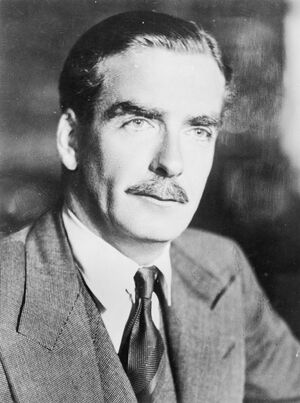Sir Anthony Maclean
Jump to navigation
Jump to search
Looking for Anthony Maclean's Lucisverse equivalent?: Anthony Maclean
Sir Anthony Maclean | |
|---|---|
 Anthony Maclean in the Upper Parliament Chamber, March 1942 | |
| Prime Minister of Vionna-Frankenlisch | |
| In office 18 September 1938 – 21 July 1945 | |
| Monarch | Albert I |
| Preceded by | Lord Robinson |
| Succeeded by | Laura Gillingham |
| Leader of the Conservative Party | |
| In office 18 September 1938 – 5 January 1951 | |
| Monarch | Albert I |
| Preceded by | Lord Robinson |
| Succeeded by | Alexander Walkins |
| Leader of the Opposition | |
| In office 21 July 1945 – 5 January 1951 | |
| Monarch | Albert I |
| Preceded by | Clarence Adlington |
| Succeeded by | Alexander Walkins |
| Personal details | |
| Born | Anthony Saville Maclean November 19, 1889 |
| Died | January 5, 1951 (aged 61) |
| Political party | Conservative |
| Spouse | Lady Maclean |
| Parents |
|
| Education | Royal Cunard School Imperial Army College, Donaldia |
| Profession | Soldier, Author, Politician |
| Cabinet | Cabinet of Anthony Maclean |
| Military service | |
| Allegiance | Vionna-Frankenlisch |
| Branch/service | Imperial Army |
| Years of service | 1906 - 1920 |
| Rank | |
| Battles/wars | Great Europan War |
The Right Honourable Sir Anthony Saville Maclean (19 November 1889 - 5 January 1951) was a Frankenlischian Army Officer, writer and politican who, between 1938 and 1945, was Prime Minister of Vionna-Frankenlisch. During his tenure as Prime Minister, Maclean led Vionna-Frankenlisch to victory in the Second Europan War. He held office in four seperate constituencies during his political career and spent most of his career as a member of the Conservative Party with a brief membership in the Liberal Party. Politically he was a Traditional Imperialist and Economic Liberal with views bordering on Monarchist Authoritarianism.